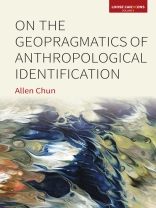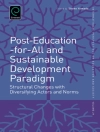On the Geopragmatics of Anthropological Identification explores the discursive spaces of our speaking position, or what has routinely been referred to in the literature as the poetics and politics of writing culture. At issue here are its problematic underlying notions of cultural identity, authorial subjectivity and postcolonial critique. Contrary to the widespread assumption that cultural studies and the social sciences share a common discourse of culture and society, Allen Chun argues that ‘modern’ disciplinary practices and axioms have in fact produced inherently incompatible theories. Anthropology’s ethical relativism has also created obstacles for a critical theory of culture and society.
Tabla de materias
Preface
Introduction: The Illusion of Anthropological Identity
PART I: ANTHROPOLOGICAL REIFICATIONS FROM ETHNICITY TO IDENTITY
Chapter 1. Toward Identification: The Unconscious Geopolitics of Ethnicity and Culture in Theory
- Disenfranchising Concepts from their Disciplinary Mindsets
- Reframing Ethnicity, Culture and Identity
- Discursive Fictions in the Geopolitics of Modernity, Nation-State, Colonialism, etc.
- Pragmatic Crises of Context in the Ecology of Social Process
- The Illusion of Identity and the Groundedness of L’Imaginaire
Chapter 2. The Diasporic Mind-field in the (Inter)Disciplinary Politics of Identity
- Diaspora as Cultural Phenomenon and Conceptual Problematic
- Diaspora as Explanatory or Emancipatory Concept in Disciplinary Perspective
- The Japanese ‘Diaspora’ in Postwar Taiwan
- Diasporic Identification as Subjective Positioning
PART II: BEYOND THE IMAGINED COMMUNITY OF WRITING CULTURE
Chapter 3. The Predicament of James Clifford in the Anthropological Imaginary
- The New and Newer Ethnography: A Short History of Consciousness
- The Fate of Geertz: ‘Culture’ and Beyond
Chapter 4. Writing Theory: Rethinking the Emancipation of the Author from his Function
- Theory, Literarily Speaking: Authorial Subjectivity from Text to Context
- Theory as Narrative: The Birth of Society and the Norm from Durkheim to Foucault
- The Limits of Imaginative Discourse within the Boundaries of Disciplinary Practices
- Unthinking the Disciplines: Steps toward an Ecology of Practice
PART III: CAN THE POSTCOLONIAL SPEAK IN SOCIOLOGICAL THEORY?
Chapter 5. Subaltern Studies as Historical Exception / Postcolonialism as Critical Theory
- Postcolonial Theories in the Concrete
- The Disciplinary Divide: Why Can’t the Post-colonial Speak in Sociological Theory?
- Subaltern Studies in the Abstract
- Decolonizing the Fog of American Identity: Lessons from Chineseness in Critical Reflexivity
- From Historical Exception to Theoretical Exceptionalism
Chapter 6. Nation as Norm, State as Exception: Unseen Ramifications of a Hyphenated Modernity
- On Geoffrey Benjamin’s (2015 [1985]) Deep Sociology of the Nation-State
- The Emergence of the State as Signifying Apparatus in the Practice of Modern Institutions
- Governmentality in the Critique of Social Theory, or the Return of Postcolonialism2
Bibliography
Sobre el autor
Allen Chun was Research Fellow in the Institute of Ethnology, Academia Sinica, Taiwan, and is now Chair Professor in the Institute of Social Research and Cultural Studies, National Chiao Tung University, Taiwan. He is the author of two major monographs: Unstructuring Chinese Society: The Fictions of Colonial Practice and the Changing Realities of “Land” in the New Territories of Hong Kong (Routledge, 2000) and Forget Chineseness: On the Geopolitics of Cultural Identification (SUNY Press, 2017).












